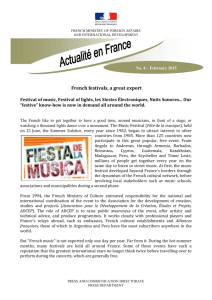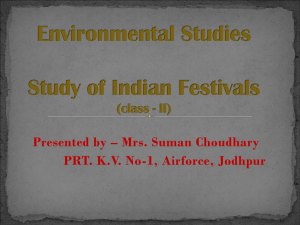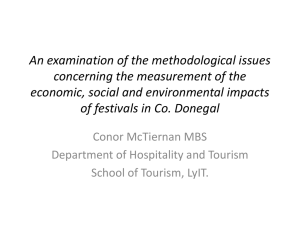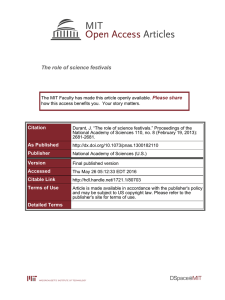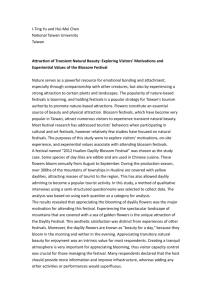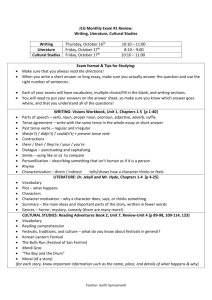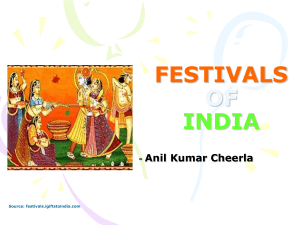BUS509
advertisement
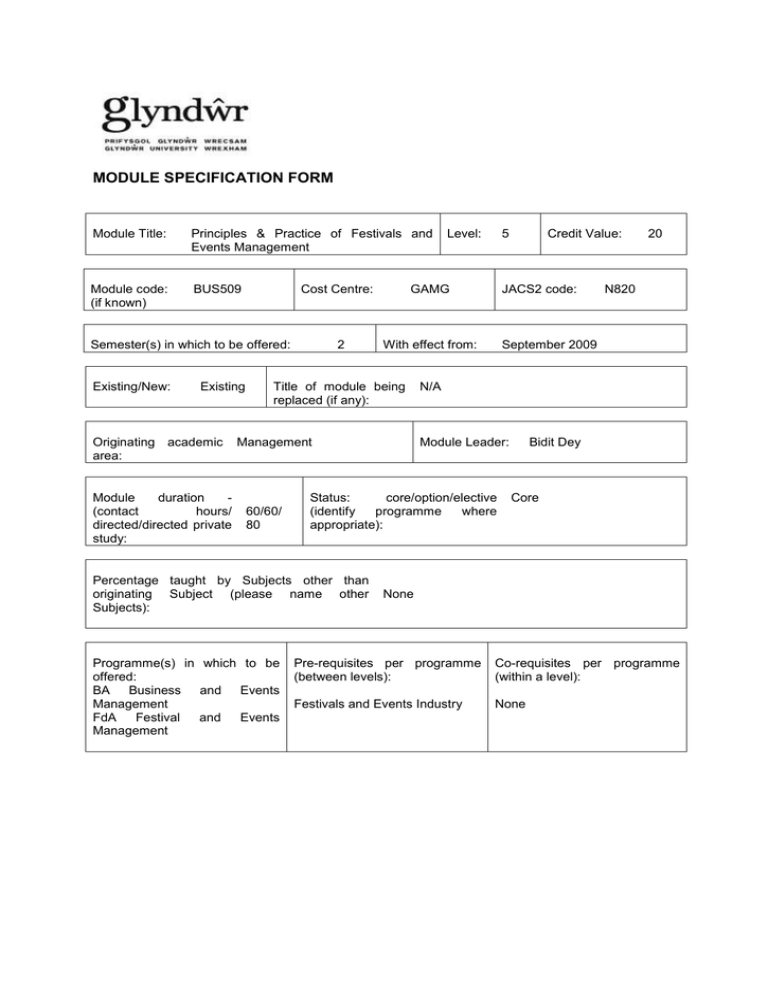
MODULE SPECIFICATION FORM Module Title: Principles & Practice of Festivals and Events Management Module code: (if known) BUS509 Cost Centre: Semester(s) in which to be offered: Existing/New: Existing Originating academic area: Module duration (contact hours/ directed/directed private study: 2 20 N820 September 2009 N/A Module Leader: Status: core/option/elective (identify programme where appropriate): Percentage taught by Subjects other than originating Subject (please name other Subjects): Credit Value: JACS2 code: With effect from: Management Programme(s) in which to be offered: BA Business and Events Management FdA Festival and Events Management 5 GAMG Title of module being replaced (if any): 60/60/ 80 Level: Bidit Dey Core None Pre-requisites per programme (between levels): Co-requisites per programme (within a level): Festivals and Events Industry None Module Aims: To introduce students to, and develop their understanding and knowledge of, the scale, scope and management and operations of the festival and events industry. This will be achieved through: 1.the dissemination of case study material relating to contemporary festival and events to extract the necessary skills, priorities and operations involved in the staging of a festival or event. 2.the study and appropriate application of related academic theory to festivals and events in practice to support the case study material 3. the placement of academic concepts into a contextual setting in relation to festivals and events Expected Learning Outcomes At the end of this module, students should be able to: Knowledge and Understanding: 1. Appreciate the growing significance of contemporary festivals and events 2. Evaluate and apply the key principles underpinning the practicalities of staging festivals and events 3. Demonstrate an understanding of the complexity and applications of event delivery 4. Assess the value and impacts of festivals and events in the private, public and voluntary sectors Transferable/Key Skills and other attributes: communicate effectively in writing and through oral presentations use CDT skills in the assessment, evaluation and presentation of issues surrounding events management research and assess facts, theories, principles and concepts related to events management apply knowledge to the solutions of familiar and unfamiliar problems within a work based context take responsibility for their own learning and continuing professional development Assessment: please indicate the type(s) of assessment (eg examination, oral, coursework, project) and the weighting of each (%). Details of indicative assessment tasks must be included. Assessment 1: Group project and presentation – significance and impact Assessment 2: Assignment - exploring the range of principles required to plan and stage a festival or event Assessment Assessment 1 Learning Outcomes be met LO1,4 Assessment 2 LO2,3, Type of assessment Weighting Group project and presentation – significance and impact Assignment - exploring the range of principles required to plan and stage a festival or event 40% to 60% Duration (if exam) Word count or equivalent if appropriate 2500 Learning and Teaching Strategies: An overall framework for the module will be developed through a series of lectures, seminars and workshops dealing with the major principles, concepts, methods, techniques and data sources. Formative exercises will be embedded within the sessions, including workshops, and buzz groups on key ideas, and exercises simulating scenarios from the practitioner world, such as, risk assessment, site appraisal or project scheduling. Formative tutorial support is provided in assessment workshops which will provide feedback and discussion on the assignment tasks and activities. Wherever possible, guest speakers and visits will be used to provide industry specific insights. Syllabus outline: Principles of Event Management What events are, different types, classification Range of events used by local, regional, national and international organisations Technology, themes and location factors Event strategies, public private and not for profit sector Practices of Event Management Issues in the planning and delivery of successful events Common resourcing and planning processes, including logistics, risk and impact analyses Project management, timing and feasibility Marketing and promotions of events Specialist event needs Bibliography Essential reading: Allen J (2009) Event Planning: the Ultimate guide to Successful Meetings, Corporate Events, Fundraising Galas, Conferences, Conventions, Incentives and Special Events, 2nd Edition, J Wiley Chichester Recommended reading: Bowden, G. et al (2006) Events Management. 2nd edition Oxford: Elsevier, Getz, D. (2007) Event Studies: A Multi-disciplinary Approach (Events Management). Oxford: Elsevier Goldblatt J (2007) Special Events: the Roots and Wings of Celebration 5 th edition J Wiley Chichester Hoyle LH (2002) Events Marketing New York John Wiley Masterman G & Wood EH (2006) Innovative Marketing Communication: Strategies for the events industry Oxford Butterworth-Heinneman Shone, A. & Parry, B. (2004) Successful Event Management: a practical handbook (2nd Edition). London: Continuum. Silvers JR (2003) Professional Event Co-ordination J Wiley Chichester Tum, J.; Norton, P. & Wright, J.N. (2006) 'Management of Event Operations' Butterworth-Heinemann Yeoman, I. et al (2004). Festival and Events Management – an International Arts and Culture Perspective. Oxford:. Elsevier Butterworth-Heinemann Other indicative reading: Event Management Body of knowledge Project www.embok.org International Journal of Event Management Research Journal of Hospitality, Leisure, Sport and Tourism Education Association of Events Management Education



